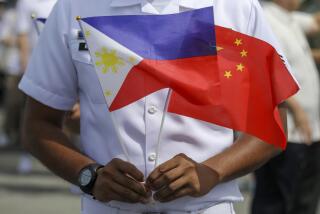Russia, Ukraine in Accord on Black Sea Fleet : Naval forces: The two ex-Soviet heavyweights are to share bases and jointly appoint commanders. A final division of ships is set for the end of 1995.
MOSCOW — Russia and Ukraine, trying once again to resolve their most persistent and explosive dispute, agreed Monday to share control of the Black Sea Fleet until the end of 1995.
The agreement between Russian President Boris N. Yeltsin and Ukrainian President Leonid M. Kravchuk, reached at a Crimean resort near Yalta, promised to ease the lingering tension between the two heavyweights of the Commonwealth of Independent States.
“The decision is important, well-thought-out and fits the situation in Russia, Ukraine and the Crimea,” Kravchuk said. “And it will calm the officers.”
Black Sea Fleet officers were riled last month when one of their escort ships hoisted the blue-and-yellow Ukrainian flag and sailed mutinously away to the Ukrainian port of Odessa. That move violated an agreement that Yeltsin and Kravchuk had reached in June that the fleet would remain under joint control.
On Monday, however, the two presidents appeared determined to let nothing interfere with their attempts at friendship.
The two silver-haired men, attired in similar gray suits, linked arms chummily and, by the end of their meeting, even announced that they are now on a first-name basis.
“Why should it be,” Yeltsin asked, “that when I talk with George Bush, we use only ‘George’ and ‘Boris,’ but with Leonid Makarovich Kravchuk, I have used only ‘Leonid Makarovich’ or ‘Respected Kravchuk’? Therefore, we have agreed on ‘Leonid’ and ‘Boris.’ ”
Under their new agreement, the two presidents will jointly appoint the commanders of the fleet, and the fleet’s bases will be shared. A final decision on the tricky division of the fleet itself is to be signed only at the end of the transition period.
Three years from now, Yeltsin said, “Society will get over its illness. There will be different realities.”
The agreement left Russian Defense Minister Pavel Grachev openly relieved that he would not have to immediately divide up the fleet’s 380 ships and 70,000 men. Talks on the division among Russian and Ukrainian defense officials had repeatedly stalled.
“I had said before that it was inadvisable to divide the Black Sea Fleet since the fleet’s command and personnel are not ready for it,” Grachev said. “The three years which have been granted us will allow both Ukraine and Russia to examine in detail how to divide the Black Sea Fleet after 1995.”
The dispute over the fleet had dragged on for months and plunged many ships’ crews into chaos, with some swearing allegiance to Ukraine and others to Russia. The disorder had reached the point that the flotilla had threatened to slough off political control altogether, Kravchuk warned before the meeting.
“There is a real danger that the fleet will start to act like an autonomous military force under neither Ukrainian nor Russian control,” the Ukrainian president said.
The Russian-Ukrainian dispute has also festered ashore, with Russia questioning Ukraine’s claim to sunny Crimea on the Black Sea’s shore, where most of the fleet’s bases are located.
The Crimea, transferred to Ukraine from Russia in 1954, is struggling for more independence from Ukraine--to Russia’s delight.
Yeltsin and Kravchuk must now try to gain approval for their new agreement from their recalcitrant parliaments, where nationalists on each side insist on maximum control of the fleet.
Yeltsin said the agreement corresponds to both Russian and Ukrainian laws, but he had cause to worry about his increasingly fractious lawmakers, who recently have also accused him of being willing to return to Japan four disputed islands in the Russian Far East in exchange for Japanese aid.
More to Read
Sign up for Essential California
The most important California stories and recommendations in your inbox every morning.
You may occasionally receive promotional content from the Los Angeles Times.










